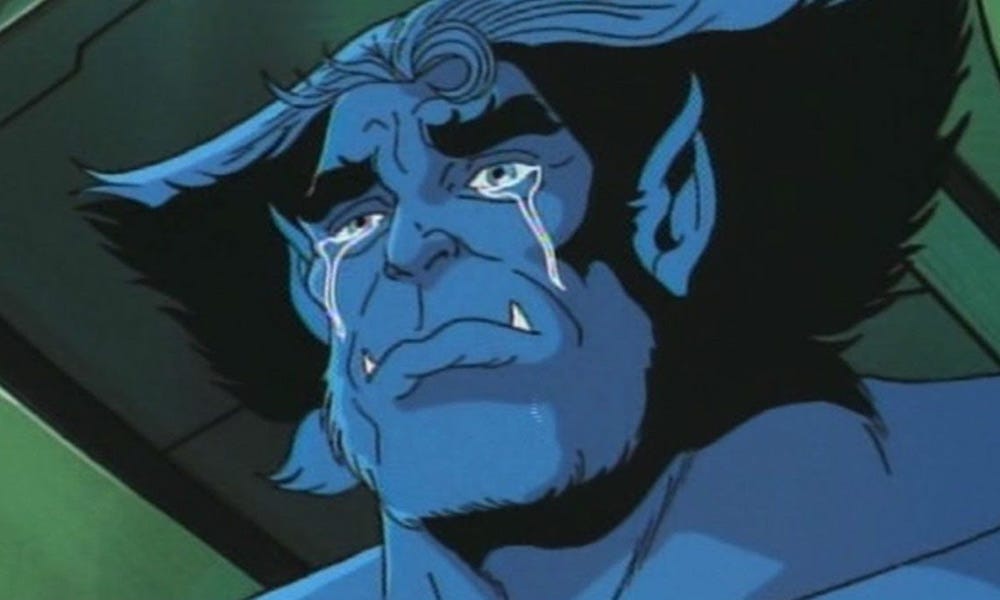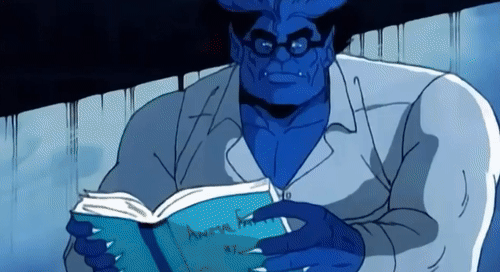This X-Men Character's Love of Poetry Got Left Out of the Film Franchise
And there's one other little wrinkle: he's insanely, maybe even overly, educated.
As Derrick Austin noted in his PopPoetry interview, X-Men: The Animated Series (1992–1997) introduced countless 90s kids to poetry more than once. How did the show work poetry into superhero situations?
Through the extraordinary character of Beast, of course.
Beast, aka Dr. Hank McCoy, was introduced to the world in 1963 in X-Men #1, making him one of the original founding members despite his spotty appearances in later film adaptations. McCoy became a mutant after exposure to radiation, and his monstrous blue exterior contrasts with the deep humanity of his well-read and well-spoken interior.
On film, Beast has been played by Kelsey Grammer and Nicholas Hoult, as well as very briefly by Canadian Actor Steve Bacic. It was veteran voice actor George Buza who gave Beast his growl, however, in the 1990s animated series. All the episodes of the series are available to stream on Disney+ as of this writing, and the word is that the show is set for a Disney+ relaunch in 2023 with Buza to reprise his role as Beast once again. Along with countless other fans young and old, my partner, who nearly jumped for joy when he came home and found me watching the show the other night, will be over the moon.
As he is in the comic books, from the very first episode of the animated series, Beast is presented as a literature buff. But that aspect of Beast was largely left out of the lucrative and popular X-Men film franchise. Why?
Here are some wonderings.
The Blue Guy
In addition to being a medical doctor and a man (beast?) of science, Beast’s analytical side is balanced out with a deep interest in the humanities. In one way, it’s awesome to see the comic book and screenwriters valorize the model of the Renaissance Man/Woman/Beast: someone who is fluent in many disciplines and is capable of succeeding in multiple pursuits. Not merely a science-head, Beast is well-versed in literature, foreign language, and philosophy. He would be more of a STEAM student than a STEM student if Charles Xavier were running a school today.
In X-Men: The Animated Series, Beast likes to help a moment land by offering up poetry in moments of high emotion. Mostly, his X-Men compatriots ignore and tolerate his recitations, and if they are moved by them, they don’t say so. Beast’s poetry is directed instead, I would argue, at us: the television audience. So what are we to glean from it?
The only issue with Beast serving as the X-Men’s resident poetry fan is the fact that he has six PhDs.
The larger issue with Beast serving as the X-Men’s resident poetry fan is that he has six PhDs, which further cements the idea that it takes superhuman (mutant?) levels of intellect to appreciate, enjoy, memorize, or recite poetry.1 If you’ve been reading PopPoetry for a while now, you know that I disagree, as do most practicing poets today.

And for a blue dude, Beast’s literary tastes are incredibly white and mostly male, as are most poets who pop up in pop culture: no surprise in a white, cis-heteropatriarchal culture and even less of a surprise in the 1990s. But to see poetry dovetail with animated superhero television at all is undeniably exciting and interesting for fans of both.
The world is changing, albeit slowly, and so is Marvel and its associated talent. For example, the white voice actor who played the Chinese-American character of Jubilee in the original animated series has declined to reprise the role and requested that an Asian actor be offered the role instead.
I wonder what poems and poets you might choose, if you could, to have your favorite Marvel character recite? If this feels like a productive mini-writing prompt, run with it!
Poetry Beast Recites in X-Men: The Animated Series

Season 1, Episode 1: Patmore, “The Farewell”
Before foiling an array of laser beams, Beast recites some fairly anodyne lines from Coventry Patmore’s “The Farewell,” Part XVI of his long poem “The Unknown Eros.” Afterward, he quips, “A minor poet for a minor obstacle.” No shit! Patmore is a Victorian poet best known for “The Angel in the House,” a narrative poem about the ideal wife. Yipes.
With faint, averted feet And many a tear, In our opposed paths to persevere.
Season 2, Episode 2: Tennyson, “Literary Squabbles”
As he battles a baddy named Ruckus, Beast recites a few lines from a lesser-known Tennyson poem about what we would today refer to as “haters.”
The noblest answer unto such Is perfect stillness when they brawl.
Season 3, Episode 7: Dickinson, “My life closed twice before its close—”
After Jean Gray dies (one of 15 times) during what’s known as the Phoenix Saga, Beast offers up some well-known lines from Emily Dickinson:
Parting is all we know of heaven, And all we need of hell.
In X-Men: The Animated Series, Beast also reads fiction like Orwell’s Animal Farm and recites Shakespeare, specifically an excerpt from Romeo and Juliet. It is Shakespeare, interestingly, who almost helps Beast bring his love of literature to bear on the big screen in the X-Men films. But alas, the closest he came was in a scene that ended up on the cutting room floor.
How dare they cut this scene from X-Men 3 in which Kelsey Grammar absolutely crushes this recitation of the end of the St. Crispian’s Day speech from Henry V.
Yeah, he went “Full Fraiser,”2 as The Poke put it in 2021. And it was glorious.
As I’ve mentioned before, I’ve seen all the Marvel & X-Men films but still consider myself to be a non-specialist, as I didn’t read the comic books and spend zero time immersed in the finer details that many very-online folks are fluent with. With that disclaimer in mind, I will say that to my knowledge, all instances of Beast’s literary interests have never made it to the final cut of an X-Men film and remain relegated to the animated series and the comic books.
Why? I would imagine that it has to do with, big surprise, the perceived marketability of poetry in the world of big-budget film. The idea that poetry is niche, not being read by young people, or alienating is false, false, false. In subsequent X-Men properties, it would be wonderful to see the writers restore the Blue Guy to his former glory as a well-read lover of poetry. Who knows? He might just inspire the next generation of young mutants poets.
Related
For more factoids about Beast culled from his every appearance in the franchise, check out this incredibly detailed listicle by Comic Book Resources. FWIW, the phrase “Beaster Eggs” is also just incredibly delightful and I haven’t been able to stop saying it under my breath for days.
Frasier Crane, of course, deserves and will assuredly have at least one, if not more, posts devoted to his poetic leanings in future installments of PopPoetry.







Never heard of Beast, but I did read comics as a boy (a period that lasted well into my 20s) and recall issues where a character would recite Shakespeare or poetry. Nowadays I wonder about the writers of those issues. To find quotes that fit a scene, you would need more than just casual knowledge of those authors, it seems to me. Why they did this at all probably had something to do with wanting to add a sheen of respectability, but also an attempt to make the dialogue as vivid and as memorable as the artwork.
In that vein, comics often dealt with circuses (although so did The Tin Drum and Wings of Desire) and this provided opportunities to introduce the slang and rough language of carnies without dipping into profanity. (I remember coming across the word “rube” for the first time in a comic and thrilling to how great that word felt in the mouth.) Same with the colorful language of the criminal underworld, although that’s long been true of movies and songs too. When Frankie shoots Johnny, her 44 goes “roota-toot-toot,” something I associate with that song.